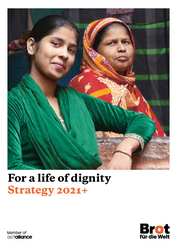Implementing the Paris Climate Agreement
... more


Global warming poses an existential threat to humans and nature. If we do not succeed in limiting the increase in temperature to 1.5° Celsius compared with pre-industrial levels, we risk an unstoppable spiral of climate change with dramatic effects. The rise in sea levels and persistent natural disasters such as droughts will render many regions of the Earth uninhabitable.
We are already feeling the effects of the climate crisis today. It is accelerating the loss of biodiversity and endangering the Earth’s natural equilibrium. Fertile land is being lost. This causes new poverty and hunger, fuels conflict over land and water, and forces whole communities to leave their homes. The climate crisis is a crisis of justice that calls into question the fundamental values of social coexistence and human rights. Those who will bear the brunt of this development are the people in the Global South – in other words, those who are already hard hit by the effects of climate change.
By 2030, global greenhouse gases must be halved and by 2050 they must be almost completely eliminated. To wean ourselves off the use of fossil fuels, we all need a change in mindset – society, the economy, politics and every individual. The Global North, in particular, has a duty to take action.
Climate change demands that we shape our lifestyles and economies in a way that is in harmony with the needs of the whole world. The climate-friendly restructuring of the economy and society must be based on the principles of shared responsibility, mutual solidarity, and justice. In future, all states must contribute their fair share. Churches and partner organisations are also planning their route to climate neutrality.
We have to permanently protect our natural ecosystems, switch to sustainable energy sources, and facilitate the transition to a sustainable economy. Clear regulatory frameworks at national and international level must support the countries of the Global South so that they are also given the chance of meeting 100 per cent of their energy needs from renewable sources. Towns and cities must be designed so that current and future generations can live sustainably. In rural regions, climate-friendly and adapted forms of agriculture are needed.
At the same time, the countries and communities affected must be strengthened so that they are better able to mitigate the impacts and risks of climate change. This requires sufficient international funds – including compensation for the loss and damage already suffered.
The world needs a climate policy that is founded on human rights. This must be based on climate justice, ambitious climate targets, a global energy transition and appropriate international funding for climate action. Because everyone should be able to live in a sustainable and just society and with dignity.

“
„I lost my boat and my nets in Cyclone Sidr. I didn’t know how I would feed my family, so I went to the capital, Dhaka, where I worked on construction sites as a day labourer. When the team from the NGO CCDB came to our village I returned home. I tried out a wide variety of farming methods that have been adapted for our region and produce good harvests despite climate change. Now I have a future here.
“
Abdul Rahim
former fisherman from Padma/Bangladesh
We develop concepts, together with local actors, that allow them to adapt the way they live and work to climate change. We do this in close consultation with Diakonie Katastrophenhilfe and in cooperation with researchers and scientists.
We step up the expansion of renewable energies in collaboration with the local population and are looking for solutions that are appropriate for their region. Our partner organisations, the scientific community and churches work hand in hand.
We assess, together with our partners, the climate relevance of projects. These joint efforts are building substantial resilience to climate change.
We encourage churches and church-based networks in particular in the Global South and in Germany to act in a climate-sensitive manner and to meet the challenge of climate change politically and from a moral and theological perspective.
We initiate educational processes in Germany for the socio-ecological transformation of society. Across the world, we are working with our partners to raise awareness among policymakers and societies about the global consequences of climate change.
